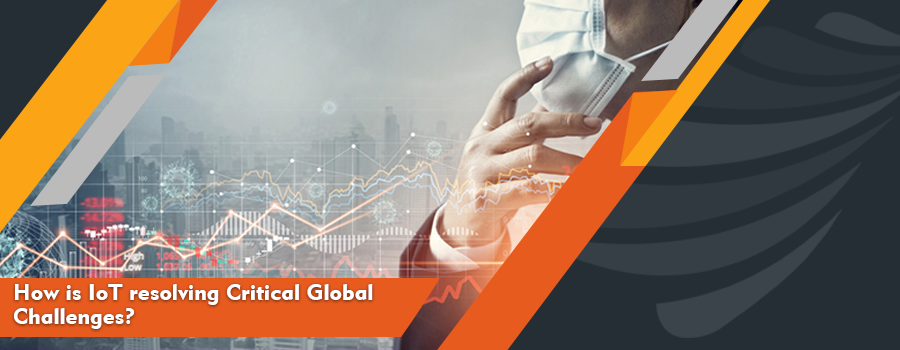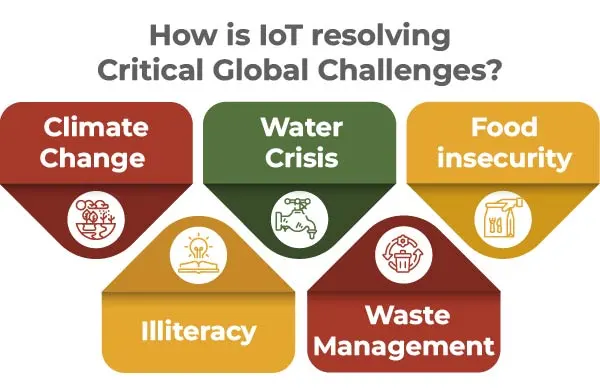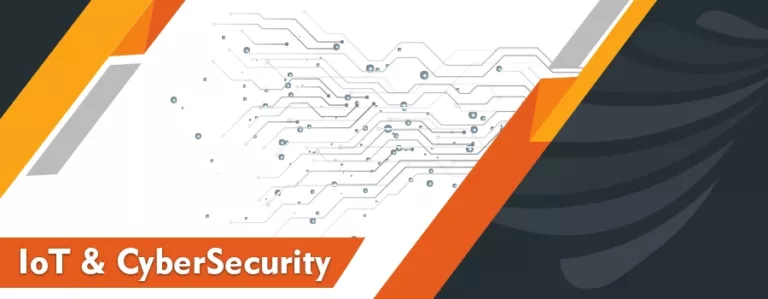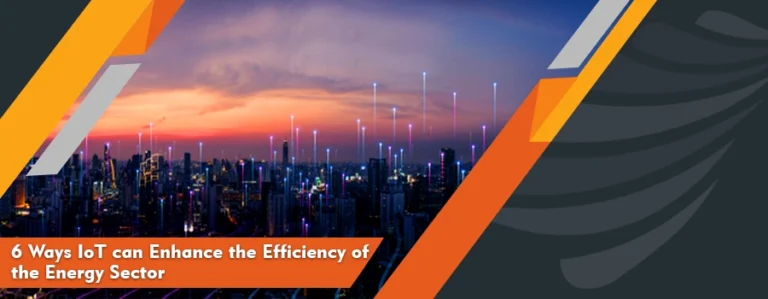It is a fact that the Internet of Things has encircled the whole world by making things easily available, accessible, and controllable through the power of the internet. IoT innovations have significantly reduced human effort by digitally linking physical objects around us, technologically taming them to work or stop with our single tap command on the smart screen.
Likewise, IoT-powered smart solutions are mostly utilized to cater to the needs of the people. It is used to ease human input and curtail physical activity by smartly and automatedly working on the given command. Electronic appliances like TV, stoves, air conditioner, Stereos, doorbells, and alarm systems can be connected to your smart home system, making such appliances intelligent and automated. The same IoT technologies can be applied to resolve critical global challenges. Since IoT is based on smart technology, adaptive sensors, and intelligent software, it can significantly reduce the impacts of global issues.
Our world is consistently saturated with Smart solutions and AI-based devices, silently slowing down the progression of global threats while reducing their harmful effect on mankind. Below are the critical global challenges that IoT solutions are resolving:
• Climate Change
Climate change is one of the major global issues adversely affecting mankind. Climate change essentially means the long-term significant change or shifts in the earth’s temperature and weather patterns. Human activities like industrialization, mass production, and burning of fossil fuels for energy production are among the primary driving cause of climate change. Harmful and warm gases from industries, vehicles, smoking, etc., get trapped in the earth’s sphere, which increases the global temperature and adversely changes the weather patterns of the world. This is also why Climate change is also referred to as Global warming.
Nevertheless, IoT solutions tend to counter such global issues. For instance, IoT-powered smart meters and grids can be vital in energy consumption. It can increase energy efficiency by creating smart communication between suppliers and consumers. This helps the supplier to meet the demands of consumers effectively while reducing energy production costs. Also, IoT innovations can help reduce atmospheric pollution by monitoring air quality through smart sensors. In addition, IoT-powered traffic management solutions like automated traffic signals and parking solutions like ParkSmart can prevent traffic congestion on the road. Smart solutions like such prevent extra time for the driver looking for parking spots with the running engine. This will automatically reduce the emission of CO2 and greenhouse gases, which are great contributors to climate change. Thus, it results in a smart, sustainable city for dwellers.
• Water Crisis
Another critical global issue is the water crisis. As per United Nations, 1.8 billion people will face absolute water scarcity conditions by 2025. This shows that almost every nation will soon be facing water-related problems in the future. Water is an integral part of life’s emergence and sustainability on earth. Thus, water shortage can threaten the presence of almost every existence.
Given the situation or possibility of water shortage, IoT plays a crucial role in preserving and managing water supply. For example, smart IoT-enabled sensors can be deployed at water preservation sites like dams, reservoirs, and tanks to consistently and timely monitor the water level. This will provide data-driven analytics, which can further facilitate the smart implementation of water conservation strategies. Furthermore, IoT in agriculture can reduce the burden of water supply. Agriculture is one of the main sectors that utilize a major water supply ratio. However, with the right smart solutions and sensors for irrigation, an adequate amount of water can be sprinkled on crops while keeping in check the moisture level data. This will significantly reduce the demand for water and increase its preservation.
• Food insecurity
Food insecurity and hunger in one of the major global issues that have serious effects on mankind. Moreover, the agricultural sector’s yield capacity and production correlate directly with food insecurity. The agricultural sector’s inability to produce the demand food ratio for a population can result in higher food prices, leading to hunger and malnourishment. Plus, locust attacks and uncertain environmental conditions, climate change, earthquakes, torrential rains, and floods easily destroy crops. This increases agricultural insecurity, and hence hunger and starvation.
However, with IoT-enabled smart solutions, farmers can easily manage their crop yield by having a precise weather forecast. As discussed above, IoT in agriculture can significantly reduce farmers’ stress by providing accurate reports on weather updates. Plus, deploying smart sensors on farm equipment, water supply, and wherever necessary can help them gain data-driven knowledge about their crops’ condition. Thus, it can guide them in making the best decision for their crops and smartly maximizing their yield.
• Illiteracy
Illiteracy is one major roadblock in urban living. This crucial global threat harms a sustainable city as it reduces living standards. Illiteracy is one of the major reasons for the lack of opportunities and poverty. They all are interconnected to each other and burden the transformation of an ideal smart city. Likewise, a lack of proper resources, updated knowledge, and the absence of appropriate teaching mechanisms, especially in underdeveloped nations, push the population into illiteracy and poverty. In addition, the recent bout with the Covid pandemic severely affected the literacy rate as learners could not grasp or participate in their learning endeavors due to the shutdown of the educational system.
However, IT-based solutions and IoT innovations allowed most students to continue their learning aims. Despite being disconnected from the urban settings and its life, IoT has enabled learners from backward or rural regions to easily seek and access knowledge to nourish their brains. It has reduced the effects of the pandemic by continuing the learning endeavor through different mobile and web applications. Such platforms have helped learners collaborate and gain knowledge from their teachers without physically attending schools or other educational institutions. Thus, multiple technological advancements play crucial roles in overcoming the illiteracy rate, significantly reducing poverty, and increasing job opportunities while ensuring progressive urban living.
• Waste Management
Solid waste production is also one of the leading global issues, threatening our environment through the guises of land and water pollution. The increasing population of the earth means a significant increase in solid waste across the globe. This shows that the world is in dire need of smart solid waste management. The absence of adapting smart waste disposal solutions can be very lethal for different forms of life. It could harm society’s overall health and peace, negatively impacting the completion of smart, sustainable cities.
Luckily, with IoT innovations and smart waste disposal solutions, different societies have learned to develop smart solid waste management. Stakeholders have begun to incorporate different smart solutions to make their urban living sustainable, healthy, and flourishing. For instance, BinWise is an IoT solution consisting of smart sensors which generate alerts to the waste manager about the fill level of the bin. It also guides the garbage collection trucks about their real-time location with the best route through a mobile app. Moreover, many AI-based recycling centers also play a crucial role in disposing and recycling solid waste garbage. This method helps them to utilize solid waste for something useful like energy production for the welfare of mankind.
To Conclude…
In a nutshell, IoT innovation and smart solutions are not only making our personal life better and less physically strain-full but also improving the environment in which we live. With the help of automated, data-driven, and tech-savvy features, it is smartly countering and resolving multiple global issues and challenges, which in the end, benefits the whole of mankind.





